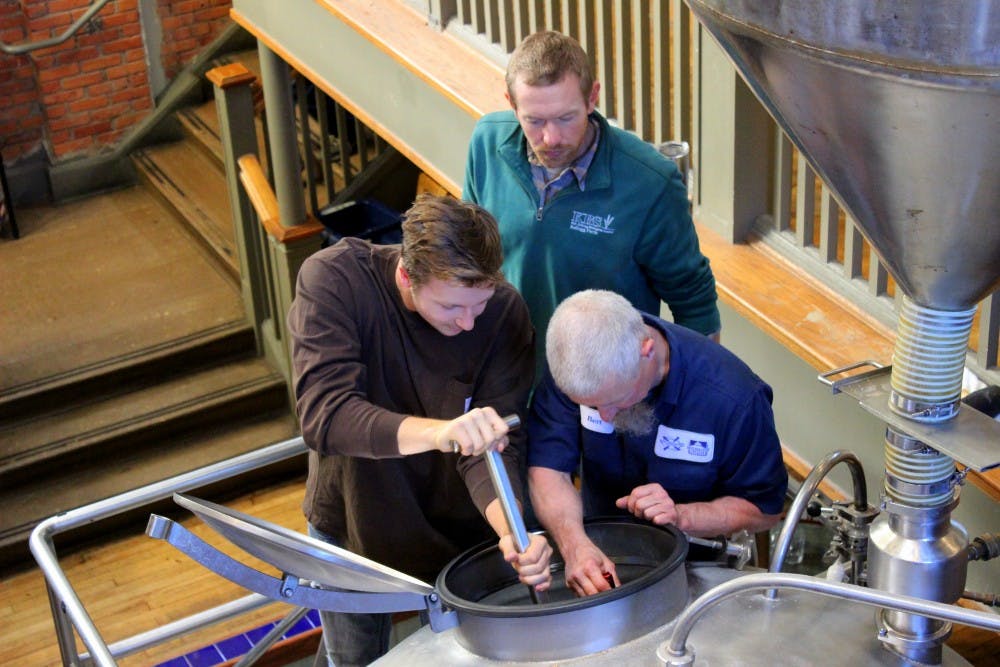Back in 1916, when MSU was still Michigan Agricultural College, a new variety of barley was bred at the college, aptly named Spartan barley.
The barley was first available to growers sometime between 1918 and 1920 and became popular throughout the state of Michigan and the Midwest, coordinator for the MSU Upper Peninsula Research and Extension Center Ashley McFarland said.
The popularity of Spartan barley didn’t last forever. There came a point when there were breeds that were more favorable to growers.
“Eventually, Spartan just really wasn’t grown anymore because varieties that yielded better and just did better in the fields kind of took them over,” McFarland said.
McFarland said the researchers at MSU decided to look into reviving Spartan barley partly because of the rise in popularity of craft beer in Michigan.
Russ Freed, a now retired breeder who worked at MSU, was the one responsible for beginning the process of reviving Spartan barley.
To get his hands on Spartan barley, Freed had to do some searching.
“I went to the USDA Germplasm Bank in Idaho and I got in touch with the person in charge of barley and they sent me a packet of five grams of Spartan barley, which I had in storage,” Freed said.
McFarland was one of the people who brought the idea to Freed in the first place.
“The reason we got into Spartan barley is because just the whole craft beer movement in Michigan and buying local ingredients has really sparked an interest in knowing where your food comes from,” McFarland said.
McFarland then brought up Spartan barley to New Holland Brewing pub brewer Steve Berthel, who then began to look into brewing with Spartan barley.
Berthel said he was very excited about the possibility of brewing a beer using Spartan barley because it gave him an opportunity to work with one of his passions — local ingredients.
“If you’re a brewer and you’re in my position, who wouldn’t want to make a batch of beer and be the first one since the 1920’s to do that,” Berthel said. “I’m not looking for any personal glory, it’s just these are friends of mine that are putting this together and I just think it’s awesome to be able to make a batch of beer and have it turn out well and get people aware of what we’re doing with Michigan ingredients.”
In addition, there’s a certain history to Spartan barley a lot of people identify with. Some people McFarland spoke to mentioned that family members, or they themselves, grew Spartan barley back in the day.
“When I was traveling throughout the state I would get comments from farmers talking about, ‘Well, do you know there’s a Spartan barley?’ or ‘My grandfather used to grow Spartan’ or talking to some of the old-timers who were like, ‘Wow, I remember when I used to grow Spartan barley,’” McFarland said.
Regarding the beer itself, Berthel wanted to make a beer similar to what was being brewed at the time Spartan barley was first available. This led to brew what he referred to as a “pre-prohibition lager.”
Additionally, the beer is made from entirely Michigan ingredients, all the way down to the most basic ingredients.
“I can honestly say that it’s a 100 percent all-Michigan lager, starting with Lake Michigan water, which we have abundantly here by Holland,” Berthel said. “The yeast strain is called ‘UP Lager.’ It comes from craft cultures in up Houghton/Hancock area. ... The barley is 100 percent Spartan barley from Hickory Corners and then I used three proprietary hops that are from Michigan and these trace back to the mid-1800s.”
McFarland also said they hope to use Spartan barley to improve other, higher yielding barley to grow in Michigan.
“The fact that Spartan does pretty well in our climate, that’s very interesting from a genetic standpoint,” McFarland said. “Whether or not we could potentially down the road take any of those traits and breed them into other more modern varieties that would be higher yielding, but still do well in our climate.”
Berthel said the beer, which is called “Russ’s Revival” and named after Freed, will be available in the Lansing area starting Dec. 11.
Regarding being the namesake of this beer, Freed said, “It’s very special — I never in the wildest of my dreams figured there would be a beer named after me.”







